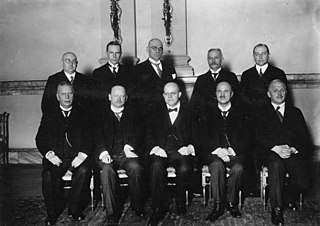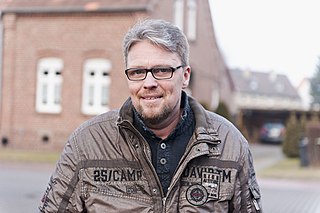Related Research Articles

Gustav Walter Heinemann was a German politician who was President of West Germany from 1969 to 1974. He served as mayor of Essen from 1946 to 1949, West German Minister of the Interior from 1949 to 1950, and Minister of Justice from 1966 to 1969.

The Communist Workers' Party of Germany was an anti-parliamentarian and left communist party that was active in Germany during the time of the Weimar Republic. It was founded in April 1920 in Heidelberg as a split from the Communist Party of Germany (KPD). Originally the party remained a "sympathising member of Communist International." In 1922 the KAPD split into two factions, both of whom kept the name but are referred to as the KAPD Essen Faction and the KAPD Berlin Faction.

The Prussian Union of Churches was a major Protestant church body which emerged in 1817 from a series of decrees by Frederick William III of Prussia that united both Lutheran and Reformed denominations in Prussia. Although not the first of its kind, the Prussian Union was the first to occur in a major German state.

Nikolaus Gross was a German Roman Catholic. Gross first worked in crafts requiring skilled labor before becoming a coal miner like his father while joining a range of trade union and political movements. But he soon settled on becoming a journalist before he got married while World War II prompted him to become a resistance fighter in the time of the Third Reich and for his anti-violent rhetoric and approach to opposing Adolf Hitler. He was also one of those implicated and arrested for the assassination attempt on Hitler despite not being involved himself.
Johann Franz Langewand was a German Catholic politician in the Weimar Republic, member of the Centre Party, and a member of the Prussian state parliament.

Max Reimann was a German communist politician and member of the Bundestag.

Karl Bernhard Fritz Schröder was a communist politician and writer.

Rudolf Wissell was a German politician in the Social Democratic Party of Germany (SPD). During the Weimar Republic, he held office as the Minister for Economic Affairs and Minister for Labour.
Robert Richard Lipinski was a German unionist, politician and writer, who was active in Germany's Social Democratic Party and the Independent Social Democratic Party.
Velbert is a German town in North Rhine-Westphalia which made up of three former towns: Velbert, Neviges and Langenberg. The town's history began during the Middle Ages.

Heinrich Brauns was a German politician and Roman Catholic theologian, who for the German Center Party was a long-serving Minister of Labour of the Weimar Republic from 1920 to 1928. Serving in a total of 13 cabinets, Brauns was a major influence on social policy in the period of German history.
Otto Franke was a German trades union pioneer, politician and peace activist.

Hermann Remmele was a German communist politician of the SPD, USPD and KPD. During exile in Moscow he carried the code name Herzen.
Hermann Schubert was a German political activist and politician. In 1924 he briefly sat as a member of the national parliament (Reichstag), representing the Communist Party of Germany.
Heinrich Gottlieb Imig was a German trade unionist and politician.
Carl Stenger was a German politician and trade union leader.

Guido Reil is a German politician who is serving as an Alternative for Germany Member of the European Parliament.
Reinhard Sommer is a German former trade union leader.
Fritz Schlessmann, born Georg Friedrich Schlessmann was a Nazi Deputy Gauleiter of Gau Essen and served as Acting Gauleiter for most of the Second World War. He was also a prominent police official and SS-Obergruppenführer.

Ottomar Georg Alexander Geschke was a German politician, trade unionist and anti-Nazi activist.